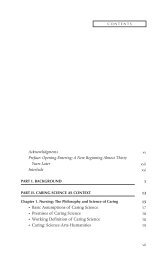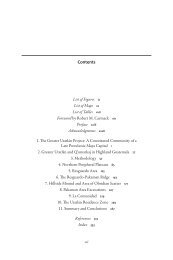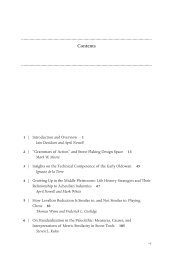free download - University Press of Colorado
free download - University Press of Colorado
free download - University Press of Colorado
You also want an ePaper? Increase the reach of your titles
YUMPU automatically turns print PDFs into web optimized ePapers that Google loves.
Nelson et al.<br />
what (Carpenter et al. 2001) Any strategies humans deploy to cope with<br />
disturbances introduce fundamental trade<strong>of</strong>fs. To develop effective coping<br />
strategies in a rapidly changing world, we must recognize that a decision<br />
to increase resilience in one dimension is likely to increase vulnerabilities in<br />
another (Anderies et al. 2007). In two <strong>of</strong> the examples described in this chapter,<br />
we address human vulnerability to climatic variability and change, specifically<br />
focused on precipitation and stream flow, and we explore trade<strong>of</strong>fs. We<br />
contribute to an emerging literature that focuses on robustness-vulnerability<br />
trade <strong>of</strong>fs to understand how social-ecological systems organize, cope with<br />
variation, and change (Anderies 2006; Anderies et al. 2007; Anderies, Walker,<br />
and Kinzig 2006; Janssen, Anderies, and Ostrom 2007). In the third example<br />
we specifically focus on how human social configurations can create conditions<br />
<strong>of</strong> vulnerability that influence the way people experience disturbances, climatic<br />
changes, and variability.<br />
Following the theme <strong>of</strong> this book, we view low precipitation and variable<br />
precipitation conditions as potential “hazards” within the southwestern<br />
United States and northern Mexico to which people may be or may become<br />
vulnerable. Hazards can be thought <strong>of</strong> as “threats to a system and the consequences<br />
they produce” (Turner et al. 2003: 8074). We outline features <strong>of</strong> climate<br />
conditions in the southwestern United States and northern Mexico that<br />
may be potential hazards, and we explore the role <strong>of</strong> social configurations in<br />
creating hazards and preventing people from responding effectively.<br />
Advantages <strong>of</strong> a Long-Term Perspective<br />
We use data sequences that span millennium-long timescales in the southwestern<br />
United States and northern Mexico to assess how human societies and<br />
ecosystems interact. In this region <strong>of</strong> the world, low precipitation and variable<br />
precipitation are challenges or potential “hazards” for human occupation today<br />
and have been throughout human history. For farmers, the levels <strong>of</strong> precipitation<br />
in this region <strong>of</strong> the world are highly variable temporally and spatially and<br />
typically fall below the minimum needs <strong>of</strong> many domesticated crops (especially<br />
maize, the primary cultigen). The potential “hazards” <strong>of</strong> low precipitation and<br />
uncertain timing <strong>of</strong> precipitation can create conditions <strong>of</strong> famine whose timing<br />
can be uncertain. But the experience <strong>of</strong> potential hazards—whether they<br />
are realized and experienced as hazardous conditions—depends on a variety <strong>of</strong><br />
social factors, from population size to the forms <strong>of</strong> physical infrastructure and<br />
social institutions. People address climatic challenges such as low and variable<br />
precipitation in various ways, from diversifying their use <strong>of</strong> resources and using<br />
a range <strong>of</strong> environmental settings, to building infrastructure (such as irrigation<br />
systems) to control the distribution <strong>of</strong> water, to settling in areas <strong>of</strong> high natural<br />
water table, which are rare (Spielmann et al. in press).<br />
200





